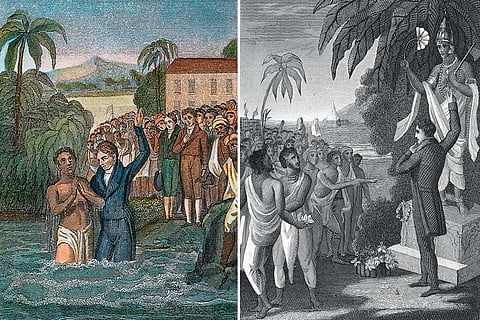The increasing association of religion with violence has emerged as one of the pressing issues of our times. Religion seems to be invoked as an ally for violent tendencies across traditions—be it in the name of jehad by ISIS, rise of conservative Christianity in the western world, intolerance of the Hindutva forces in India or of the Buddhists vis-a-vis the Rohingya in Myanmar and so on. Jonathan Swift’s comment many years ago that we have just enough religion to make us hate, but not enough to make us love one another, seems to have assumed a poignant relevance today. Despite the pessimism of the times, though, there is also a growing propensity among religious traditions to engage in activities that make for peace. As I write this, I am participating in the Nobel Peace Prize ceremonies as part of a delegation of the International Campaign to Abolish Nuclear Weapons, an initiative against violence that has united people across faiths in pursuit of a peaceful future.
Violence In The Name Of God Is Violence Against God
Though the rise of Christianity was based on a nexus of empire and religion, at its heart is the aspiration for peace
No doubt we have seen religion being evoked in contexts of violence; but we also need to acknowledge that opinions on this association of religion with violence are varied and even sharply divided. Among the important arguments that connect religion to violence are those that consider violence to be intrinsic to religion. Since the roots of violence can be found right back in the religions, they can easily serve as vehicles for violent tendencies.

(Left) William Carey baptising the first Hindu convert, a carpenter, in the Hooghly river, line engraving from 1837; ‘Rev. J. Thomas putting to shame the Brahmins and exciting the ridicule of the people at idol worship’, line engraving from 1832
There are others who dismiss the opinion that religion is a trans-historical entity and perceive the association of religion and violence in the wider web of the intersectionality of religion, culture, politics, economics and ethnicity. In a context where the guilt of violence is put squarely and solely on the shoulders of religion, absolving other non-religious factors such as politics and economics of any complicity in violence, these arguments denounce the notion that religion is an independent source of violence.
The wide spectrum of answers to the question ‘What has God got to do with this?’ have included the arguments of the atheist philosophers like Richard Dawkins who furiously argue that only religious faith is a strong enough force to motivate such utter madness in otherwise sane and decent people, which has resulted in large-scale violence. That they often make their arguments without necessarily and sufficiently taking into account the role of non-religious or even anti-religious forces in violence is a different matter.
On the other side, we have those like former Chief Rabbi of Britain, Rabbi Jonathan Sacks, who firmly advocates that “when religion turns men into murderers, God weeps and says not in my name” in his book Not in God’s Name. Other academics haven’t given a clean chit to religion.
More recently, the Indian Christian theologian Sathianathan Clarke’s latest book Competing Fundamentalisms: Violent Extremisms in Christianity, Islam and Hinduism engages and explores the need for religious communities to ask with honesty the question as to why certain groups and individuals seek to do harm in the name of God. Whatever has been said, it seems inevitable that anyone in their true conscience cannot bypass the question ‘What has God got to do with violence?’
My own basic starting point to answer this question is that any violence carried out in the name of God is violence against God. The first book of the Bible, the Book of Genesis, makes it explicit that all human beings are created in God’s image, hence murder and the shedding of human blood are anathema to God’s will for the world. The fact that these words were placed in the early chapters of our holy scriptures reveals the essential heart of our belief that religion should never be used to justify violence.
Having made this point, however, it is important to acknowledge that there have been several examples in history where almost all the major religious traditions, including my own, have tried to use religious motives to justify violent actions. Therefore, honesty is an important point when we deal with the vexed topic of God and religions. The moral impetus to end violence in the name of religion is inevitably and inextricably interlinked with the honest admission by religious people about the ways in which religion has been used to underpin violence.
Let me from this premise of honesty engage with the issue of God and religion from a Christian perspective. This is not the opportunity for making a moral detour around the question of Christianity’s complicity with violence. History testifies to how Christianity was evoked to support evils such as apartheid, slave trade, patriarchy, segregation, anti-semitism, Islamophobia and colonialism.There is no denying that the nexus of empire and religion, which provided foundations for the rise of Christianity in the West, was deeply problematic and the continuing effects of colonialism’s flawed legacy are still a sore point in relations between Christians and their neighbours of other faiths across the world.
Here, I will focus on issues that may be of relevance to the Indian context, not the least the questions surrounding the colonial legacy of Christianity or the contentious issues of religious conversions.
A lot has been written about the problematic nexus between colonialism and Christianity in India. The notion that Christianity’s entry into Asia was vitiated by imperialism, a degree of racism and a dose of western culture is widespread even in a context like India. It is important to note that when speaking of colonialism in such a context, one cannot just talk of violence in a material sense. Violence can be also associated with the notion of a ‘threat’ to culture, traditional ways of living and religious membership.
The narrative of colonialism for many in India is a triumphalist missionary story of the nexus of the missionary, military and merchant, which threatened the supplantation of native religions and cultures without any credible attempt to understand these religions on their own terms. A recent document produced by the World Council of Churches, The Church: Towards a Common Vision (2014), also acknowledges that “at times, the cultural and religious heritage of those to whom the gospel was proclaimed was not given the respect it deserved as when those engaged in evangelisation were complicit in imperialistic colonisation”.
Having acknowledged the problematic dimension of colonialism, it is also equally important to recognise that the issue of the relationship between Christianity and colonialism in a context like India is much more complex and ambiguous than often assumed. Missionary work did not always take place under imperial patronage. In fact, in some INStances, the colonial rulers considered mission a hindrance to trade relations and were not always supportive of missions. The fact that European empires invoked religious justification for their existence and expansion “citing a command to extend the light of God’s kingdom into regions of pagan ignorance (sic),” to use the words of Philip Jenkins, it is not the same as coercing their new subjects to embrace Christianity.
We also need to pay attention to the other side of the story where Christians in the 19th- and 20th-century Indian context were so deeply conscious of the problematic entanglement of colonialism with Christianity that they resorted to the decolonisation of Christianity—not the least through their strong tendencies towards inculturation and nation-building—to ensure that the religion is purged of its western influence.

Australian missionary Graham Staines and his two sons were burned alive by Hindutva extremists in Orissa, in 1999
Christianity’s link to colonialism is made even more contested and complex in the light of subaltern perspectives, which point out how Christianity and colonialism challenged existing power structures in the context of internal colonialism like the caste system in India. Given this breakdown of hierarchy and opening of access to education and employment in symbolic power structures like churches, mission schools and hospitals for Dalit and tribal communities, the dominant critique of colonialism cannot be seen in isolation from the preservation of the privileges of elite groups that benefited from internal colonialism. Subaltern perspectives do not exonerate colonialism, but they do show why tensions over the shift in power structures is also the proper context for considering its relationship with Christianity.
Another contentious issue that needs discussion is the question of religious conversions. Christianity has often been accused of proselytisation by force and fraud in India. Recognising the importance of this theme, the World Council of Churches alongside the Pontifical Council for Interreligious Dialogue of the Holy See initiated a joint project titled ‘Interreligious Reflection on Conversion: From Controversy to a Shared Code of Conduct’ in May 2006. The culmination of this project is the document titled Christian Witness in a Multi-Religious World: Recommendations for Conduct, jointly produced by the World Council of Churches, the Pontifical Council for Interreligious Dialogue and the World Evangelical Alliance.
Among the issues that the document highlights is the question of inappropriate methods of mission. The document emphasises that “exercising mission by resorting to deception and coercive means” is a betrayal of the gospel and that “the exploitation of situations of poverty and need has no place in Christian outreach. Christians should denounce and refrain from offering all forms of allurements, including financial incentives and rewards, in their acts of service.”

An important issue concerns the autonomy and agency of those who convert. For example, groups that indulge in fraudulent conversions as well as those that oppose conversions of the poor and marginalised often have an elitist understanding of free will and autonomy. While those indulging in fraudulent conversions try to extend material inducements with the motive to convert, those who oppose these conversions treat them as essentially incapable of exercising their own free will, and lacking the moral and intellectual capacity to distinguish motives. It is important that conversations on conversions touch upon the question of the autonomy and agency of those who choose to convert because otherwise the boundaries between force and consent would be dangerously blurred. Conversations on conversions can touch upon the factors that shape the autonomy of the converts and focus on creating conditions in which the autonomy of the convert can be exercised without restraint.
The question of fraudulent and forcible conversions has affected Christian relations with Hindus and Buddhists in India and Sri Lanka, where religious conversions have in the past two decades been associated with religious violence. Conversion was cited as a justification for the murder of the Australian Christian missionary Graham Staines and his two sons in January 1999 in Orissa as well as the violence against Christians in Kandhamal district of the same state in August 2008. Similarly, attacks have been carried out against churches in Sri Lanka as retaliation for forcible conversions. The condoning of violence as appropriate retaliation for religions conversions is a cause for concern for many Christians. In such contexts, Christians need to be aware that religious conversions are perceived as a serious threat by adherents of eastern religions. A report by the Oxford Centre for Hindu Studies, Bridges and Barriers to Hindu-Christian Relations, commissioned by the Hindu-Christian Forum, UK, points out that for adherents of Hinduism “conversion appears as an attack on the community, and seems to inculcate a denigration of the value of its beliefs”. Denigrating other faiths for the sake of proselytisation should be recognised as un-Christian and counter-intuitive to the gospel mandate of loving God and loving one’s neighbour as oneself.
Now let me turn to the theme of love. For Christians, this mandate to love God and one’s neighbour as oneself offers the strongest motivation to overcome violence. The Bible clearly states that “everyone who loves is born of God and knows God. Whoever who does not love does not know God” (1 John 4:8). Christian complicity in any form of violence is a denial of Christian discipleship to live and share God’s love.
However, before we let the pessimism over the troubled association of religion with violence take over, what is needed today is the optimism that stems from honesty and hope. From an honest acknowledgement that we have for long been part of the problem can emerge the hope that we can be part of the solution. It is high time all religions, including Christianity, acknowledged with honesty and hope that our religions offer both perils and promises for a better world.
The challenge is to embark on a pilgrim path that overcomes the perils and embraces the promises as co-sojourners of this earth, our common home, through mutual critique and cooperation. Only in this walking and working together may we be able to break new paths where justice and peace will thrive and the world will know violence no more.
Rev. Dr Tveit is a Norwegian Lutheran theologian and general secretary of the World Council of Churches